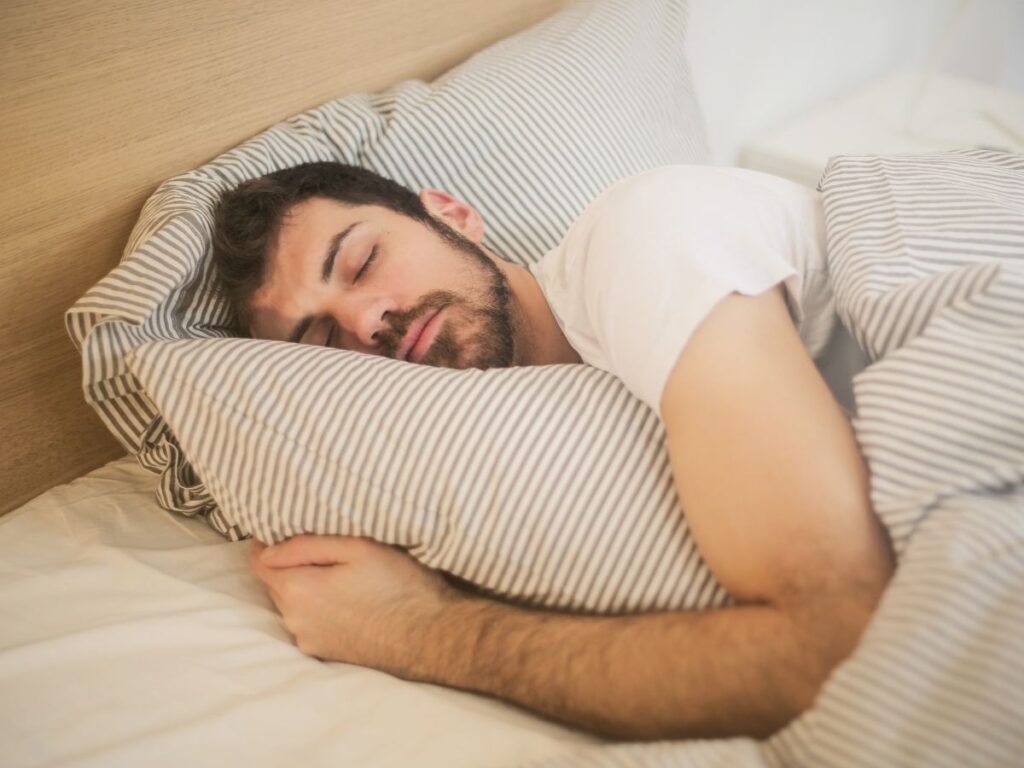Many of us know what it is like when we do not get enough sleep. We feel grumpy, tired, and slow. On the other hand, a good night’s sleep can make us feel ready to take on the day. It is not just our bodies that benefit from rest. The mental health effects of sleep have also long been established.
An average person spends about one-third of their life sleeping, which is as vital to survival as food and water. In psychology, sleep is when a person suspends consciousness and becomes less sensitive to external stimuli. According to the Journal of Clinical Sleep Medicine, it is essential to maintain the physical and mental well-being of a person. Some of the functions linked to healthy sleep are cognitive abilities, mood, cardiovascular and metabolic health.1

How to Get the Full Mental Health Effects of Sleep
There are several factors that need to be considered when it comes to healthy sleep. These are its duration, quality, and regularity. In other words, it is not just the number of hours you spend on your bed. You need to wake up refreshed and feeling well-rested.
Sleep Duration
People have individual needs when it comes to sleep, but there are certain guidelines issued by sleep experts. For example, the American Academy of Sleep Medicine recommends that the average adult should sleep at least seven hours at night. The National Sleep Foundation (NSF) also has a similar recommendation. A study conducted to find the optimal sleep duration of individuals recommends seven to nine hours of sleep for adults.2
The amount of sleep a person needs can vary based on age and genetics. In general, younger people need more sleep than adults. Newborns, for instance, need as much as 17 hours of sleep a day. The ideal number of hours of sleep stabilizes as the person ages.
It is important to note that there is no such thing as catching up on sleep. It is a myth that you can sleep more at another time to bank or make up for lost sleep. Research indicates that inconsistent sleep contributes to a decline in health.
Sleep Quality
Aside from the number of hours spent sleeping, sleep quality should also be considered. It does not matter if you are reaching the required number of hours if your sleep is not working the way it should. The NSF has issued recommendations on sleep quality, which identified the four features of good sleep. The first is sleep latency, or how long it takes for a person to fall asleep. The second is the number of times sleep is interrupted by waking up. Next is how long these sleep interruptions last. Finally, sleep quality also depends on how long a person stays in bed compared to the time actually spent sleeping.3
In an ideal situation, you should fall asleep easily when it is time for bed and you should have continuous, uninterrupted sleep. This is what quality sleep looks like and is what will allow you to get the full benefits of sleep.
Sleep Consistency
Some studies state that sleep regularity, or the timing of when a person sleeps and stays awake, is a strong indicator of health. In fact, a study of about 60,000 individuals showed sleep regularity is a predictor of mortality risk. According to the authors, “Sleep regularity may be a simple, effective target for improving general health and survival.”4
While it is important to get enough sleep, consistency is also a significant factor in achieving wellness.
The Negative Mental Health Effects of Sleep Deprivation
It is clearly established that having good sleep is vital. But, what happens when you miss the mark?
The quick answer is that you do not feel your best. However, the effects of the lack of sleep go down to the most basic functions of the body. It might seem like your body is at rest while sleeping, but it is actually quite active. In fact, there are studies that indicate that sleep has a neuroprotective function. A 2015 study by Andy Eugene and Jolanta Masiak states that during sleep, the brain recharges and removes waste products accumulated during the day.5 Essentially, there is evidence that shows sleeping clears the brain and helps it work properly.
In psychology, it is known that sleep allows people to process their emotions and helps regulate stress. Sleep deprivation can raise cortisol levels.6 Cortisol is the body’s main stress hormone, which can trigger feelings of alertness. When there is chronic sleeplessness, the stress can be overwhelming. It can even result in anxiety. This is because sleep deprivation is linked to more reactive emotions. When people lack sleep, the connection between the amygdala and the pre-frontal cortex is disrupted. This is significant because the amygdala processes emotions, while the prefrontal cortex is linked with impulse control and decision-making.
The link between sleep and mental functions is clearly established. When there is insufficient sleep, the risk of mental health issues increases. 7 In fact, insomnia, or the inability to sleep, is a symptom of many mental health disorders. In my experience as a psychologist, I also see depression worsen when a person does not get enough sleep. Anxiety can also be triggered.
Unfortunately, the mental health effects of sleep are a bit of a chicken and egg situation. Which came first? They tend to reinforce each other. There is a distressing cycle where mental health issues can cause sleeplessness, and sleeplessness can cause mental health issues. Each person can have a different experience, but one thing is clear: lack of sleep is an important concern and deserves to be addressed immediately.
How to Get Better Sleep
Treatment for lack of sleep depends on the cause. For instance, there are some physical ailments like asthma or gastroesophageal reflux disease where insomnia is a recognized symptom. In these cases, medication may be necessary to address sleeplessness. I also recommend cognitive behavioral therapy as a treatment because it addresses thought patterns and behaviors that can affect the ability to fall asleep.
The Mayo Clinic has practical advice on how to get better sleep. Among its suggestions are developing a consistent sleeping routine, making sure the environment is conducive for sleeping, and engaging in physical activities during the day. It also highlights how certain types of food and drink can interfere with sleep. I suggest avoiding caffeine and alcohol because these can interfere with the quality of your sleep.
The environment, stress levels, and even physical health can affect the quality and quantity of sleep you get. Since each person experiences their own circumstance, there is no one path to better sleep. It is worth it to find out which methods work best and seek professional help when necessary.

Conclusion: The Mental Health Effects of Sleep is Vital
When people talk about being healthy, it usually involves diet and exercise. Rarely do people boast about how much sleep they get. But, sleep is as important as what you eat and how much physical activity you get.
With the growing evidence that poor or insufficient sleep increases the risk of mental health conditions, it is worthwhile to examine your sleep habits. Aside from the hours of sleep you get, you should also consider its quality and consistency. Your sleep — or the lack of it — has a huge impact on your quality of life. It is a key component in maintaining mental well-being.
Cited Sources
- Ramar K, Malhotra RK, Carden KA, et al. Sleep is essential to health: an American Academy of Sleep Medicine position statement. J Clin Sleep Med. 2021;17(10):2115–2119. ↩︎
- Hirshkowitz, Max et al. National Sleep Foundation’s sleep time duration recommendations: methodology and results summary. Sleep Health: Journal of the National Sleep Foundation, Volume 1, Issue 1, 40 – 43 ↩︎
- Ohayon, Maurice et al. National Sleep Foundation’s sleep quality recommendations: first report. Sleep Health: Journal of the National Sleep Foundation, Volume 3, Issue 1, 6 – 19 ↩︎
- Daniel P Windred, Angus C Burns, Jacqueline M Lane, Richa Saxena, Martin K Rutter, Sean W Cain, Andrew J K Phillips, Sleep regularity is a stronger predictor of mortality risk than sleep duration: A prospective cohort study, Sleep, Volume 47, Issue 1, January 2024, zsad253, https://doi.org/10.1093/sleep/zsad253
↩︎ - Eugene AR, Masiak J. The Neuroprotective Aspects of Sleep. MEDtube Sci. 2015 Mar;3(1):35-40. PMID: 26594659; PMCID: PMC4651462. ↩︎
- Hirotsu C, Tufik S, Andersen ML. Interactions between sleep, stress, and metabolism: From physiological to pathological conditions. Sleep Sci. 2015 Nov;8(3):143-52. doi: 10.1016/j.slsci.2015.09.002. Epub 2015 Sep 28. PMID: 26779321; PMCID: PMC4688585. ↩︎
- Saghir Z, Syeda JN, Muhammad AS, Balla Abdalla TH. The Amygdala, Sleep Debt, Sleep Deprivation, and the Emotion of Anger: A Possible Connection? Cureus. 2018 Jul 2;10(7):e2912. doi: 10.7759/cureus.2912. PMID: 30186717; PMCID: PMC6122651. ↩︎
